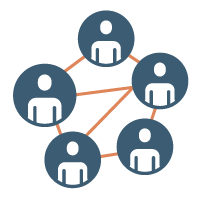Behavioral interview questions are used to uncover how a job candidate acted in a specific situation. They’re meant to gauge a candidate’s skill level, ability to manage stress and professionalism. They’re based on the premise that past behavior is the best predictor of future behavior.
Why ask behavioral interview questions?
The perfect hire doesn’t exist, but you can get an almost perfect hire. A great way to do this is to include behavioral interview questions in your interviewing process.
Behavioral interview questions aren’t another fad. They’re a time-tested tool to help any hiring manager get past a candidate’s resume quickly and dig into the essence of the person sitting in front of them.
There are few better ways to assess a job candidate’s abilities than to hear them tell you, in their own words, how they managed a challenging situation in the past, or their views on critical workplace activities and functions.
Behavioral interview questions typically start with the phrase “Tell me about a time when … ” or “Give me an example of a time when … ”
They’re used during the interview when the candidate is showing signs of feeling more relaxed, and after the hiring manager has obtained all the perfunctory information.
Most behavioral interview questions don’t have a singular correct answer. What the interviewer looks for is how well the candidate would structure an approach to solving a problem well. Let the candidate know they may not have an answer for every behavioral question because not everyone has been through every situation covered.
It takes practice to get skilled at asking these questions and evaluating the answers.
We’re here to help.
In this article, we’ve included what you need to know about using behavioral interviews, along with a list of great questions you can, and should, ask job candidates.

Behavior questions for teamwork and collaboration
Teamwork is essential to efficiency and productivity. Efficiency improves when work is properly divided among the team, responsibilities are shared, and tasks are more likely to be finished on time. Good teamwork also enhances results and the measurable effectiveness of an organization.
- Describe the most successful group project you’ve ever worked on, and tell me why you think it went so well.
- Tell me about a time you had to gather critical input from employees in other departments.
- Can you tell me about a time you had to work with a colleague whom you didn’t have a good relationship with?
- Has your team ever failed to reach a goal? Why do you think that happened?
- What’s your favorite role in team situations: leader/facilitator, change agent or worker bee?
- Tell me about a time you needed to connect with a new team member. How did you do that?
- Give me an example of a time when you really struggled with a team member. Were you able to solve this problem and get the task completed satisfactorily?
- Describe a time when you set aside your own priorities to help a team member. What did you do, and what was the result?
- Tell me about a time when you helped others compromise for the good of the team.
- What are the top characteristics of a teammate you like to work with?

Behavior questions for problem-solving and critical thinking
Problem-solving skills help employees anticipate risks and then make decisions on the best ways to proceed. People who are good problem-solvers often have personalities that make them thrive when there’s a deadline approaching or they’re facing a complex challenge. Applying critical thinking to tough situations helps guide and calm colleagues when stress levels are elevated.
- Can you describe a situation in which you found a creative way to overcome an obstacle?
- Tell me about a time you identified a need, and went beyond the call of duty to get things done.
- How would you manage a disgruntled or dissatisfied customer?
- Your manager wants to buy new software to help increase the team’s productivity, and she asks for your recommendation. How do you respond?
- A new project you’re overseeing has great revenue potential but could put the company in legal hot water. How would you handle this?
- Can you tell me about a time you had to lead a project you knew little about?
- Do you have an example of a project you worked on where the scope changed significantly? How did you manage it?
- What is the biggest mistake you’ve ever made on the job, and how did you manage it?
- Tell me about a time when you had to step away from traditional methods to solve a difficult or complex problem. Can you describe your approach? What was the outcome?
- Tell me about a time when you had to respond quickly to a crisis. What were the circumstances? What was the outcome?

Behavior questions for adaptability and resilience
Resilience, the ability to adapt to change, contributes to a company’s success by encouraging employees to face challenges confidently and learn from their mistakes. Hiring a resilient, adaptable workforce is key to job satisfaction, engagement and success.
- Have you ever had to adjust quickly to changes over which you had no control? What was the impact of the change on you?
- Tell me about a time when you had to change your point of view or your plans to consider new information or priorities.
- Can you give me an example of a time when you had to lobby someone with different perspectives for support or cooperation? How did you appeal to this person?
- Describe a situation in which your first attempt to sell an idea failed. How did you react to this? What other approaches did you try?
- Tell me about a time when your work effort didn’t go as planned (blocked by obstacles). How did you resolve this issue? What was the outcome?
- Tell me about a time when you had to accommodate unplanned activities or demands?
- Describe a time when you had to adapt quickly to changing conditions to accurately complete your job. What were the circumstances?
- Tell me about a time when you had to work in a chaotic or noisy environment. How did you deal with this situation? How did you ensure your productivity and accuracy in this environment?
- What makes an ideal co-worker in your eyes?
- Tell me about a time you bent company policy to get a job done. Was it worth the effort?

Behavior questions for communication skills
Whether face-to-face conversations, emails, chat messages, video conferencing or on the phone, effective communication helps employees get the information they need to perform well. It also builds a positive work environment and eliminates inefficiencies. Effective communication should accurately convey information while at the same time building and maintaining relationships.
- Describe a situation in which you were able to effectively “read” another person and guide your actions by understanding their individual needs or values.
- Describe a situation when you were able to strengthen a relationship by communicating effectively. What was it that made your communication so effective?
- Describe a situation where you felt you hadn’t communicated well. How did you correct the situation?
- Describe a time when you were able to effectively communicate a difficult or unpleasant idea to a superior. How did you approach the conversation and what was the outcome?
- Describe the most significant written document, report or presentation which you had to complete.
- Give me an example of a time when you were able to successfully communicate with someone who didn’t like you personally or vice versa.
- Tell me about a time when you had to use your verbal communication skills to get a crucial point across. What was the outcome of your efforts?
- Tell me about an experience in which you had to speak up to be sure other people knew what you thought or felt.
- Tell me about a time in which you had to use your written communication skills to get a critical point across.
- What challenges have occurred while you were coordinating work with other units, departments, and/or divisions? Give a specific example of when this has occurred in the past and describe what you did to overcome those challenges.

Behavior questions for leadership and management
Leaders provide direction and vision. They also motivate and inspire others to achieve goals. And they help to create an environment conducive to success by promoting communication and collaboration among team members. Leadership and strong management are essential for any organization that wants to achieve its objectives.
- Tell me about the last time something significant didn’t go according to plan at work. What was your role? What was the outcome?
- Describe a situation where you needed to persuade someone to see things your way. What steps did you take? What were the results?
- Give me an example of a time when you felt you led by example. What did you do and how did others react?
- Tell me about the toughest decision you had to make in the last six months.
- Tell me about a time when you had to sell an unpopular idea to colleagues. How did you do it? What were the results?
- Give an example of what you’ve done to earn others’ trust.
- Would you feel comfortable “blowing the whistle” on behavior that appeared unethical? Why or why not?
- Have you ever been faced with an ethical or value conflict in your job? Give an example of when this happened to you. What did you do?
- Have you ever delivered bad news or an unfavorable opinion to someone in a position above you? How did it go, and what were the consequences?
- What techniques have you used to gain acceptance of ideas or plans? Give me an example of a time when you used one of these techniques.

Behavior questions for conflict resolution
When differences arise at work, productivity often takes a beating. It can be difficult to focus or work together on a project when conflict is brewing, whether openly or just under the surface. Hiring employees skilled at resolving conflict means greater efficiency and a more cohesive team.
- Describe a time when you took personal accountability for a conflict and collaborated with the individual(s) involved to explain your actions.
- Have you ever had a colleague whose performance was consistently marginal? What did you do?
- Tell us about the most difficult or frustrating individual you’ve ever had to work with, and how you managed to do it.
- How do you define “success” in resolving a conflict?
- What was the underlying reason for the biggest conflict you’ve ever experienced? Were you or anyone able to resolve it?
- Have you ever had to take disciplinary action with someone you supervised? How did that go?
- Tell us about demanding situations in which you managed to remain calm and composed.
- How would people who collaborate with you describe your approach to solving conflict?
- Describe a conflict you wish you had approached differently than you did the first time. Why?
- Have you ever been in a situation where you had to settle a personal argument between two co-workers? What did you do? What was the result?
Uncover candidates’ skills, experiences
Too many hiring managers still tend to “wing it” when doing interviews. But as you can see, it’s straightforward to use behavioral interviewing questions to uncover candidates’ skills and experiences.
Behavioral questions are designed to help a manager get a better understanding of how the candidate has responded to situations that are likely to come up again. It’s also a way of respectfully challenging the information on the application form or resume. For example, if the candidate says they have spent time working in a management environment, they should be able to answer questions pertaining to leadership.



